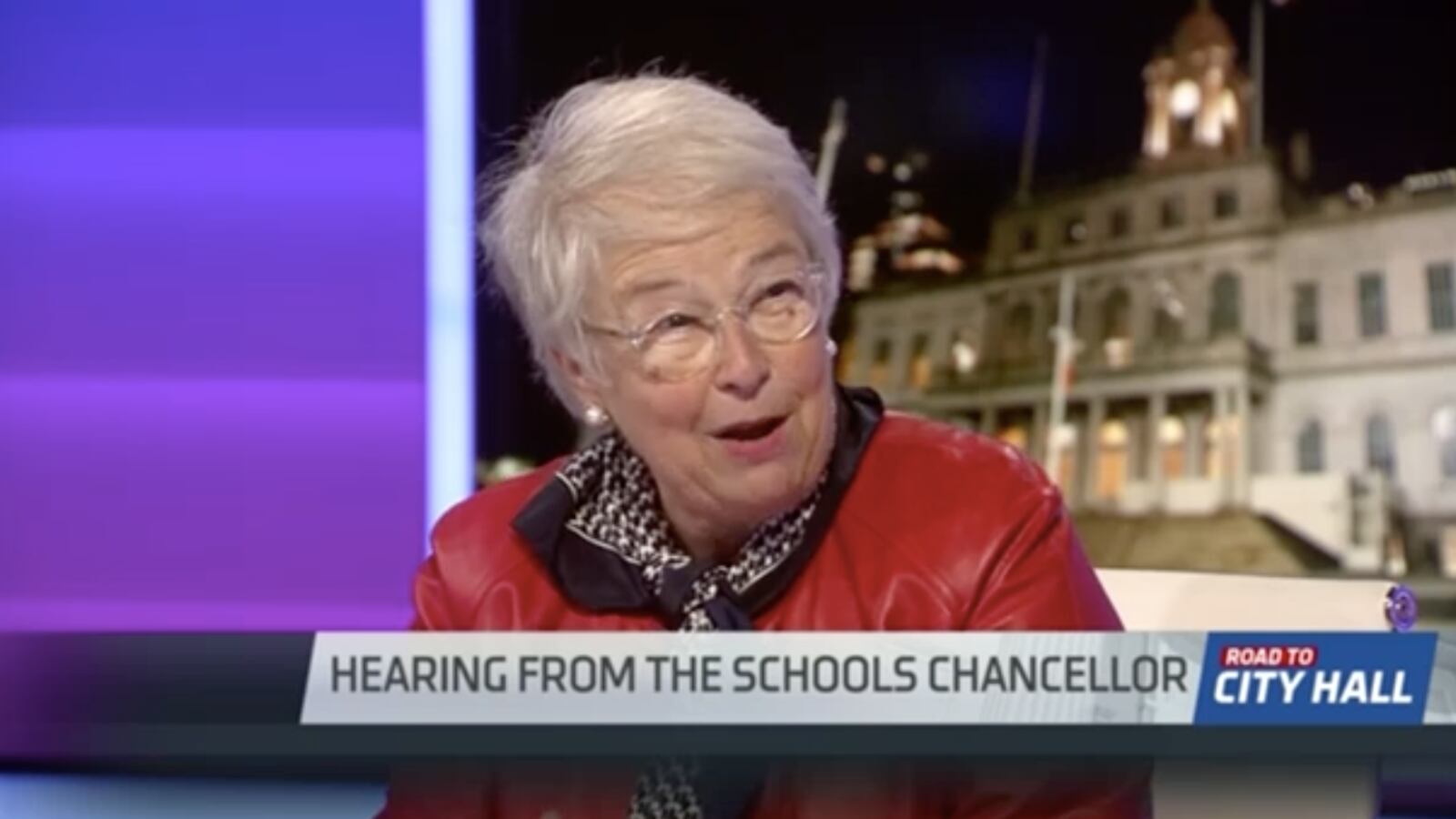Schools Chancellor Carmen Fariña urged principals in a televised interview Tuesday to keep an open mind as she sends them teachers who lost their previous jobs — though she also vowed to help them get rid of any teachers who shouldn’t be in the classroom.
She made the comments during a two-part interview with NY1’s Errol Louis, where she also spoke about an often-overlooked benefit of Mayor Bill de Blasio’s free preschool program, her goal for schools in the “Renewal” program, which infuses struggling schools with extra resources, and what she considers a major cause of school violence.
Here are some highlights:
On the “Absent Teacher Reserve”: Fariña asked principals to “take a chance” on teachers who lost their jobs at other schools.
Mayor Bill de Blasio wants to drain the pool of teachers — known as the “absent teacher reserve” — who lost their permanent jobs for disciplinary or legal reasons, or because their previous positions were eliminated, but who still receive full salaries. To do that, the city is placing those teachers in schools with openings — to the chagrin of critics (including some principals) who worry the city will offload troubled teachers onto needy schools. Fariña urged principals to keep an open mind about the teachers, while also promising to send a “whole squad” to evaluate any who cause problems.
“As a principal, I always had some of these people…I got a few teachers that ended up being really good and one or two that were miserable. And then it was my job to say, ‘OK, not only not for my school, but not for the system as a whole.’
And that’s what we’re asking principals to do, take a chance on some of these [ATR teachers] who may be very good [but] for any number of reasons they’re not in their schools. But if there’s one who you really feel should not be in any school — not just in your school — then we’ll support you.”
On a fatal school stabbing: She defended her department and the leaders of a Bronx school where two students were recently stabbed, saying no red flags were “apparent.”
At the Urban Assembly School for Wildlife Conservation last month, a student stabbed two of his classmates, killing one and wounding the other. After the incident, reports emerged that the school struggled with bullying and an unsafe environment. When asked about whether the school should have reacted sooner to “red flags,” Fariña suggested the warning signs were not clear.
“This is one of those cases where, you know, in hindsight, could you have done something differently? I still feel…I’ve been to that school four times already and I plan on going back more often. I don’t think that that was something that was really apparent. I mean, there’s a lot of issues that are still under investigation, so I don’t think that whatever is in the press is necessarily the whole story.”
On metal detectors: She walked a fine line, saying she doesn’t think they solve school violence — but she also doesn’t plan to get rid of them.
Since the stabbing, some advocates have called for more metal detectors in schools. Fariña rejected that as a solution to school violence, but also signaled that she is in no hurry to get rid of existing metal detectors.
“I don’t think metal detectors are the answer. We’re not taking them out of our schools. We have them, we’ll keep them there. But as we look at the numbers, where might we want them? There are schools that don’t want them anymore. So we look at the statistics to get that done.”
On mental health: She cited mental health as a major problem among school children — and said it can lead to school violence.
Under First Lady Chirlane McCray, the city has made improving mental health care a priority and that effort has included extra support in schools. Fariña suggested that more guidance counselors or teacher training could help students overcome any violent impulses.
“When you start looking at our kids, in second grade, that are depressed, that are anxious. I mean, it’s become a national phenomenon. How do we change that so kids do not want to either be violent or do violence to themselves?”
On universal pre-K: She noted that free preschool doesn’t just benefit kids — it also saves parents money and lets them go to work.
De Blasio’s pre-kindergarten program has been widely hailed as a success; now, he’s pushing to extend it to younger children. Though one goal of early learning is to prepare students for elementary school, Fariña suggested the positive outcomes extend to adults too.
“The most important thing that was a surprise is how much parents are benefiting in ways we didn’t expect. For example, we’re getting a lot of remarks from parents who were able to go back to work full-time. They were able to raise their family’s economic status.”
On struggling schools: She drew a line in the sand, saying schools that fall far below a target could be shuttered.
Under federal law, the state must intervene in high schools whose graduation rates sink below 67 percent. Fariña said schools in the city’s Renewal program are being held to that standard — and that she will consider closing them if they fall too far behind. That’s setting a high bar for the city’s most troubled schools, many of which have graduation rates far below that level.
“Every school has a set of benchmarks. For example, in the high schools you need to graduate at least 67 percent of your students. How far away you are from the benchmark, we give you a certain amount of time. … If you’re too far low, we close.”

